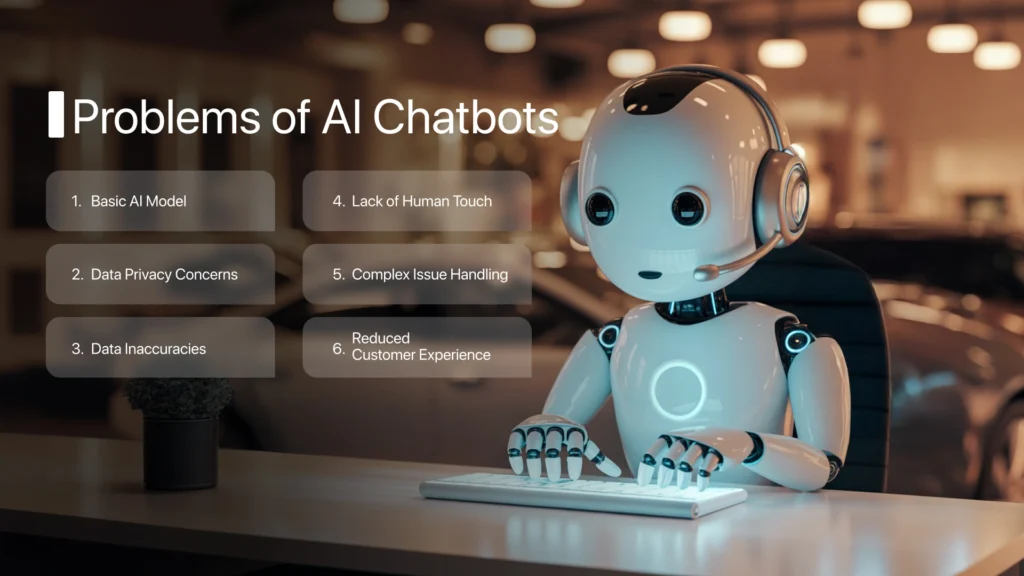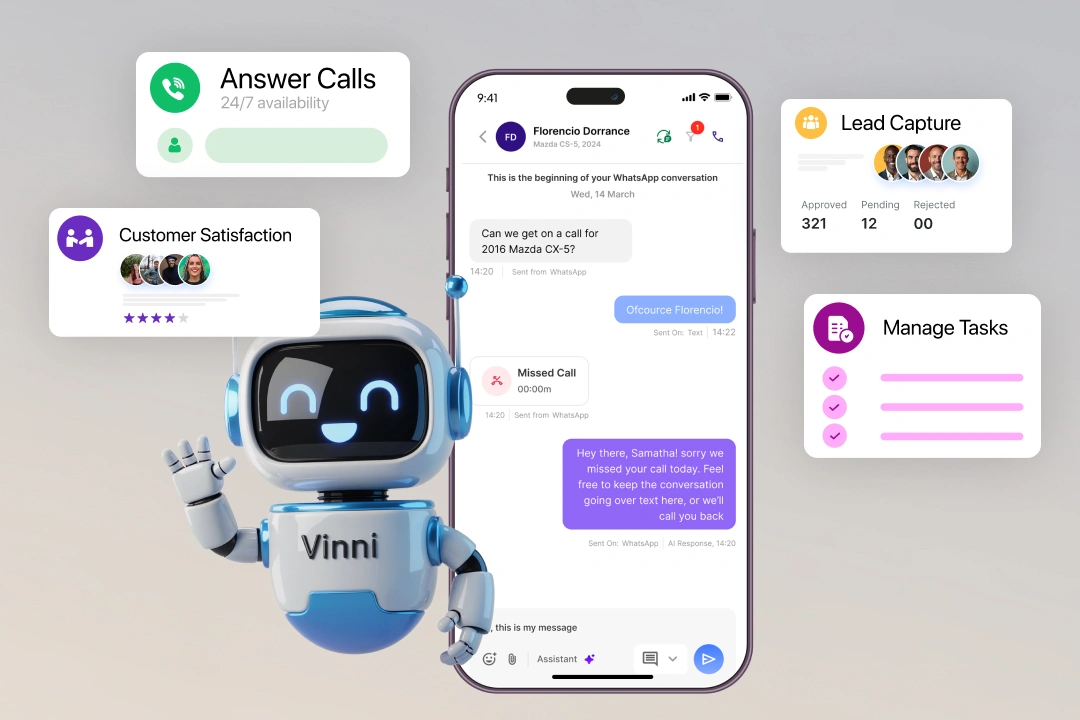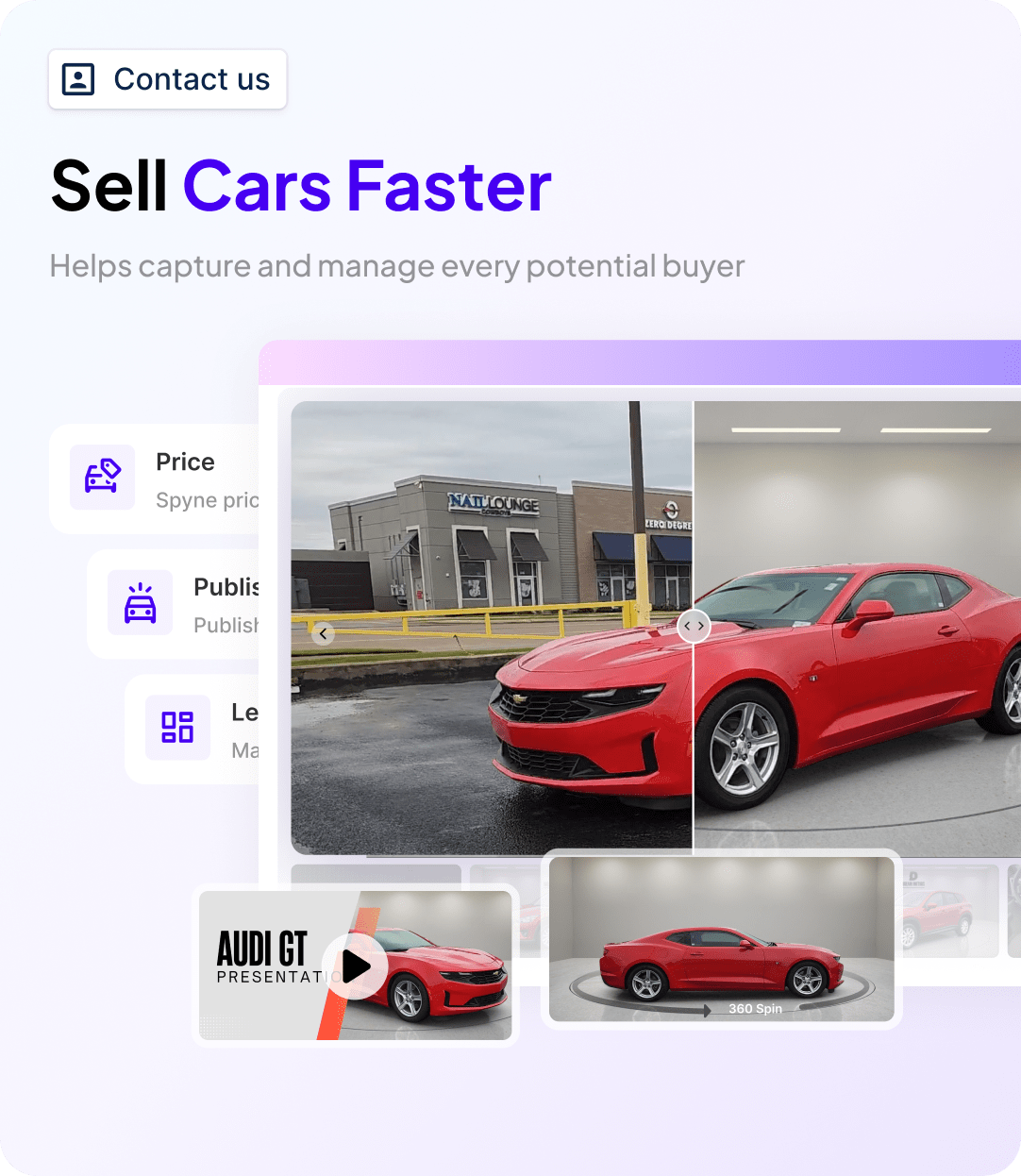Automotive Businesses are increasingly making use of AI in their workflow processes, especially in customer engagement. Modern customers expect instant responses, for which dealerships incorporate AI-powered chatbots. They help in handling customer inquiries, scheduling appointments, and making operations more efficient. Despite this convenience, auto dealers often face AI chatbot problems that come along with the implementation of chatbots. These can be inaccurate responses, generic AI models, or a lack of personal touch that customers need the most.
Go through the blog to understand some major problems of AI chatbots and the challenges that come with their implementation. Moreover, there are some strategic approaches dealerships must follow to maximize the potential of automotive chatbots in their workflow operations.
What are AI Chatbots?
AI chatbots are computer software that uses artificial intelligence technology to support customer conversations. They use AI-powered techniques like natural language processing (NLP) and machine learning (ML) to understand and respond to customer inquiries. This helps them to answer calls, deliver personalized offers and recommendations, and provide assistance in the vehicle buying process.
They are designed to help dealers provide quick support to customers who contact you through a website or chat software. Dealerships need to be aware of the AI chatbot problems in the automotive industry. They must implement intelligent chatbots to solve problems and enhance customer experience with natural and human-like interactions.
Top 6 AI Chatbot Problems for Automotive Businesses
Despite advancements made in chatbots, it can be frustrating for employees to operate them sometimes. Users may face some AI chatbot problems, including the use of a basic AI model that is not very effective, a lack of personal touch, and being unable to handle complex issues and decision-making. Here is a list of such problems with AI chatbots that hinder dealership efficiency.
1. Use of Basic AI Models
One of the major reasons why chatbots fail is that they still rely on the cheapest and most accessible model of AI, known as retrieval augmented generation (RAG) models. They provide responses and resolve customer queries by extracting information from a database only, rather than understanding the intent. This results in delivering generic or repetitive answers to customers, which reduces their experience. However, due to this 90% of customers need to give repeated explanations of their issue to get it resolved.
2. Data Privacy and Security Risks
Since AI chatbots store large volumes of customer data, they have the potential to accidentally share or leak company information or customers’ sensitive information to unauthorized individuals. This is one of the chatbot legal issues that results in degrading your brand image and reducing trust. Moreover, chatbots can also be targeted by hackers, which leads to data breaches.
3. Inaccuracies in Customer Data
Another important problem among AI chatbot problems is that they may provide incorrect information or which is not relevant to customers’ concerns. They may face updating issues, which result in delivering outdated data that may not be useful for customers, reducing their satisfaction levels.

4. Lack of Human Touch in Conversations
Chatbots are just AI tools that are used to interact with customers. Even though they are trained well to have conversations, they still lack the personal touch customers need. They lack conversational AI capabilities, which are required to understand customer behavior and purchasing patterns to deliver personalized offers and recommendations.
5. Complex Issue Handling
Chatbots are programmed for limited scenarios; hence, issues with chatbots occur when they cannot understand deep human emotions and complex customer problems that require multi-step concerns. This makes them unable to make complex decisions and handle emergency situations, therefore requiring human involvement.
6. Reduced Customer Experience
While artificial intelligence conversation tools are designed to improve customer service and enhance automotive processes, poor models and inefficiencies result in AI chatbot risks. They provide fixed robotic responses, may disrupt the customer database, or provide irrelevant solutions to address customer issues. These things altogether reduced the customer experience, impacting your dealership’s revenue model.
What are the Strategic Approaches for Dealerships to Reduce AI Chatbot Problems?
While auto dealers overlook AI chatbot problems and solutions, they struggle with the right implementation of these tools. Car dealers need to consider some strategic approaches to enhance the potential of chatbots and maximize their benefits for dealership growth and productivity.
1. Defining Real Problems
Dealerships need to identify the real problems of chatbots that they want to address. These include answering basic FAQs, enabling an automated text messaging service for car dealerships, resolving customer inquiries, and setting up service appointments by collecting basic customer information. Defining AI chatbot problems and solutions helps dealerships to solve the issues effectively.
2. Choose the Right Option
Choosing the right type of chatbot helps dealerships reduce the chances of potential issues with chatbots. Dealerships must choose the option that is suitable for resolving customer inquiries, supporting text to landline services, setting up appointments, and automating the overall workflow of the dealership.
3. Ensure Data Compliance
Ignoring data security can raise the chances of chatbot legal issues like data breaches or the leaking of customers’ sensitive information. An effective chatbot must prioritize compliance and follow regulatory standards to handle customer information securely.
4. Enable Personalization in Responses
Customers expect conversations to be natural and in a human tone rather than the fixed, generic replies that sound robotic. Dealerships must customize their chatbot to make it deliver personalized responses to customers based on their past interactions and purchases. This makes them feel recognized and helps you gain trust and foster long-term loyalty.
Pro Tip: Using Spyne’s automotive lead generation chatbot, dealerships can minimize AI chatbot problems to a greater extent. It helps to automate lead follow-ups, address real customer problems, personalize conversations, and reduce the chances of legal issues. This helps you enhance customer experience and improve operational efficiency.
What are the Challenges in the Implementation of Automotive Chatbots?
While modern dealerships implement intelligent chatbots to solve problems, it is not as easy as it sounds. Automotive businesses face AI chatbot problems in the implementation process, such as integrating existing workflow with automotive chatbots, data security concerns, and higher implementation costs. Identifying these challenges is crucial for auto dealers, ensuring smooth operational efficiency.
1. Integrity Issues with Existing Workflow
One of the main challenges to implementing a chatbot for automotive industry is the integration of AI bots with the dealership’s existing workflow processes. Seamless integrations allow smooth data flow and gain visibility into automotive fixed operations. About 55% of auto businesses benefit from the integration of an automobile chatbot with other platforms, which helps them capture leads across various sources. The integrated systems prevent scattering of information and provide a unified view of all customer data.
2. Employees Resisting to Adapt Change
Another one of the major chatbot issues raised by implementation is the resistance of employees to adapt to the AI technology in their company’s workflow processes. The automotive chatbot automates customer interactions, appointment settings, and follow-ups, which were once handled by human agents. This raises concerns among the workers about whether will AI replace receptionist and service staff.
3. Significant Implementation and Maintenance Costs
The implementation and maintenance cost of an automobile chatbot can be quite higher for smaller dealerships. They need to invest in effective software and technology for the chatbot so that it minimizes the chances of AI chatbot problems. Moreover, advanced chatbot for automotive industry require regular updates and maintenance, which results in additional expenses.
4. Customizing to Reflect Brand Identity
Automotive businesses find it difficult to customize the automotive chatbot to resonate their responses with the tone of their dealership. They need to make sure that the problems with AI chatbots do not occur in responses to customers by maintaining their brand consistency and enabling automotive chat software. Auto dealers face challenges in making their chatbot add a personal touch to conversations instead of those fixed robotic replies.
5. Measuring Automotive Chatbots KPIs
It is comparatively easier to track and monitor the human agent’s performance and the quality of customer service they provide. Unlike human customer support agents, measuring the values of chatbots is more complex. It depends on multiple factors such as lead generation, customer satisfaction levels, conversion rates, etc.
Why Should You Choose Spyne to Solve AI Chatbot Problems in Your Dealership?
Spyne offers enhanced customer engagement, reduced operational costs, and maximized conversions, all that a dealership needs. Our Retail AI platform serves as the most reliable solution for automotive businesses for addressing the major AI chatbot problems. Here is how Spyne’s automotive chatbot helps you boost efficiency and productivity.
1. Automated Customer Responses
Spyne provides an automated lead follow up system for car dealerships, which helps to deliver automated follow-ups and reminders to customers. From test drive booking to service appointment reminders, our chatbot provides 24/7 support to customers. We ensure clear and transparent communication by keeping chatbot ethics in mind.
2. Covers All the Channels
Spyne ensures your dealership is available where your customers contact, whether website, messaging apps, or on social media platforms. To solve common problems with AI chatbots, like limited accessibility, Spyne’s chatbot provides an omnichannel contact center by integrating with various communication platforms, enhancing customer experience, and boosting lead conversion.
3. Supports Smooth Integration
The common AI chatbot risks include inaccurate data entry and delayed responses while integrating the chatbots into existing workflows. Spyne ensures smooth integration with automotive CRM and other dealership systems, including DMS, scheduling software, etc. This helps to capture leads automatically, gain insights into customer details and interactions, and provides a unified view of operations.
4. AI-Powered Lead Prioritization
Spyne doesn’t just capture leads; it prioritizes high-intent prospects based on their past interactions and preferences using AI lead scoring for car dealerships. This enables your sales team to focus on high-intent opportunities that are ready for conversion. This not only saves time but also reduces the chances of chatbot legal issues related to handling customer information safely and focusing on the right prospects.
5. Affordable and Scalable Solution
Spyne offers a cost-effective and scalable solution for car dealerships. Whether you own a small dealership or a larger one, our chatbot can store and manage a high volume of customer data and interactions while maintaining the consistency of customer service. Spyne grows with your dealership, solving common AI chatbot problems like high setup costs and limited scalability.
Conclusion
Chatbots are becoming an essential element of customer engagement for businesses, especially car dealerships. They provide instant responses to customers, enhancing their experience. From generating leads to handling service bookings, these AI-powered conversation tools ensure you never miss a lead. But with advancements come some AI chatbot problems, which car businesses shouldn’t overlook. These common chatbot issues hinder your operational efficiency and reduce the customer experience. Strategic planning and approaches help you maximize the potential of these chatbots and use them in a positive direction.
Unlike generic chatbots, Spyne provides advanced automotive chatbots that combine artificial intelligence and automation to make your automotive operations faster and more efficient. Book a free demo with Spyne and experience the growth your dealership gains.
















